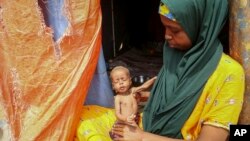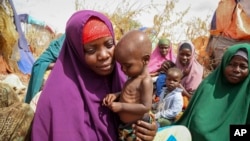Members of the Intergovernmental Authority on Development, a regional bloc that includes Djibouti, Eritrea, Ethiopia, Kenya, Somalia, South Sudan, Sudan and Uganda, met Tuesday in Nairobi to discuss humanitarian, political, and security issues in the region.
The humanitarian situation that has made more than 23 million people in Ethiopia, Kenya and Somalia food insecure took center stage at IGAD’s 39th head of state and government meeting. Kenyan President Uhuru Kenyatta said the countries in the region need to combat the drought situation.
“The drought, the worst in 40 years, has intensified food insecurity, dried up water resources and forced displacement of people, raising tensions that could trigger new conflicts,” said Kenyatta. “We urgently need to manage the drought before it becomes a threat multiplier.”
Some parts of the region have had four consecutive seasons without rain, forcing millions to move in search of food, water and pasture. Sudan’s leader, Abdel Fattah al-Burhan, said the drought greatly affects the region and people’s lives.
“If we do not handle the drought situation, it's going to be the worst we have seen in 40 years,” said the leader. “Drought is killing our people and livestock. The drought has also become a reason for our under development.”
Experts predict the region may fail to get any rain between October and December. Amina Abdulla is the regional director for the Horn of Africa at Concern Worldwide, an Irish humanitarian agency. She recently warned that without urgent humanitarian assistance to millions, the region risks losing 350,000 children to hunger. In Somalia, eight areas are at risk of famine and at least 200,000 children have died due to malnutrition since January.
Climate change and conflict are also blamed on the region's food insecurity. Bankole Adeoye, the African Union’s commissioner for political affairs, peace and security, assured the IGAD members of the bloc’s support to mitigate the effects of the drought.
“The humanitarian situation, which has been further complicated by the COVID-19 pandemic and by the drought being experienced in many parts of the region, is concerning and the African Union herewith pledges African solidarity and collective responsibility,” said Adeoye. “It’s for us all to continue to fight the glaring effect of climate change in the world today. The African Union is ready to mobilize African and international partners to fight this scourge and to promote sustainable growth and development.”
Humanitarian agencies estimate 5 million children in the Horn of Africa region are malnourished, with 30 percent experiencing severe malnutrition. The European Union ambassador to Kenya, Henriette Geiger, told IGAD leaders that efforts are being made to get much-needed food from Ukraine.
“The security situation in the region is aggravated by unprecedented drought in the Horn and by Russian aggression, which caused the global food crisis,” said Geiger. “In Europe, we are working with the U.N. to transport grain out of Ukraine and the European Union, and its member states pledged over 630 million euros [$648 million] recently to strengthen food systems and resilience here in the Horn of Africa.”
The United Nations says it needs at least $4.4 billion to provide assistance until next month. But the donor support has fallen short of the targets.





